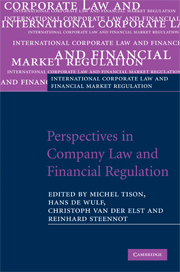Book contents
- Frontmatter
- Contents
- List of contributors
- Foreword
- PART I Perspectives in company law, SECTION 1: European company law: regulatory competition and free movement of companies
- 1 The European Model Company Act Project
- 2 The Societas Privata Europaea: a basic reform of EU law on business organizations
- 3 Ius Audacibus. The future of EU company law
- 4 Free movement of capital and protectionism after Volkswagen and Viking Line
- 5 Centros and the cost of branching
- 6 Towards the end of the real seat theory in Europe?
- 7 The Commission Recommendations of 14 December 2004 and of 15 February 2005 and their implementation in Germany
- 8 The Nordic corporate governance model – a European model?
- PART 1 Perspectives in company law, SECTION 2: Corporate governance, shareholders' rights and auditing
- PART 1 Perspectives in company law, SECTION 3: Takeover law
- PART II Perspectives in financial regulation, SECTION 1: European perspectives
- PART 2 Perspectives in financial regulation, SECTION 2: Transatlantic perspectives
- PART III Miscellaneous
- Index
- References
3 - Ius Audacibus. The future of EU company law
A basic reform of EU law on business organizations
from PART I - Perspectives in company law, SECTION 1: European company law: regulatory competition and free movement of companies
Published online by Cambridge University Press: 04 August 2010
- Frontmatter
- Contents
- List of contributors
- Foreword
- PART I Perspectives in company law, SECTION 1: European company law: regulatory competition and free movement of companies
- 1 The European Model Company Act Project
- 2 The Societas Privata Europaea: a basic reform of EU law on business organizations
- 3 Ius Audacibus. The future of EU company law
- 4 Free movement of capital and protectionism after Volkswagen and Viking Line
- 5 Centros and the cost of branching
- 6 Towards the end of the real seat theory in Europe?
- 7 The Commission Recommendations of 14 December 2004 and of 15 February 2005 and their implementation in Germany
- 8 The Nordic corporate governance model – a European model?
- PART 1 Perspectives in company law, SECTION 2: Corporate governance, shareholders' rights and auditing
- PART 1 Perspectives in company law, SECTION 3: Takeover law
- PART II Perspectives in financial regulation, SECTION 1: European perspectives
- PART 2 Perspectives in financial regulation, SECTION 2: Transatlantic perspectives
- PART III Miscellaneous
- Index
- References
Summary
An Elf shall go
Where a Dwarf dare not?
Oooh, I will never hear the end of it.
Gimli in Lord of the Rings, TolkeinIntroduction
The European Union originally was conceived as creating an economic community between Member States. A key pillar of the European Community is the principle of free movement as expressed in the free movement of persons, goods, services and capital. Together with the EU rules on competition they form the European Community's economic constitutional law. Part of the free movement of persons is the freedom of establishment. This freedom includes ‘the right to take up and pursue activities as self-employed persons and to set up and manage undertakings, in particular companies or firms…under the conditions laid down for its own nationals by the law of the country where such establishment is effected, subject to the provisions of the Chapter on capital’ (Article 43 Treaty of Rome). In order to attain freedom of establishment the Council and the Commission are required to ‘co-ordinate to the necessary extent the safeguards which, for the protection of the interests of members and others, are required by Member States of companies or firms…with a view to making such safeguards equivalent throughout the Community’ (art. 44 (2) (g)). This Treaty provision is the basis for the harmonization of company law in the European Union. It is a rather peculiar basis.
- Type
- Chapter
- Information
- Perspectives in Company Law and Financial Regulation , pp. 43 - 60Publisher: Cambridge University PressPrint publication year: 2009
References
- 1
- Cited by



